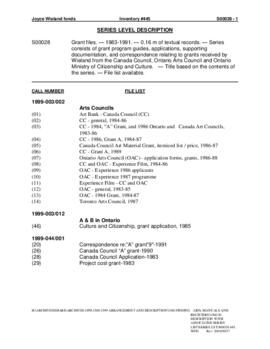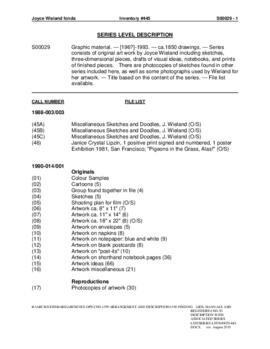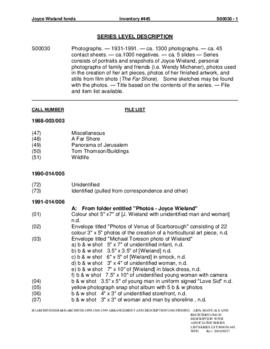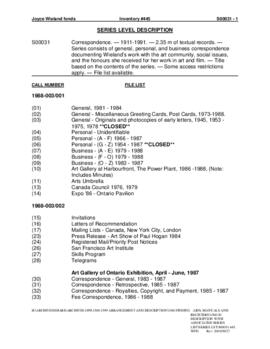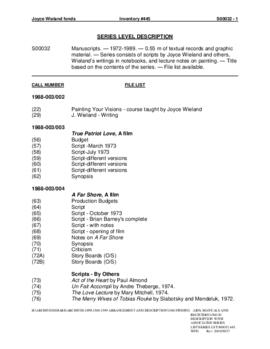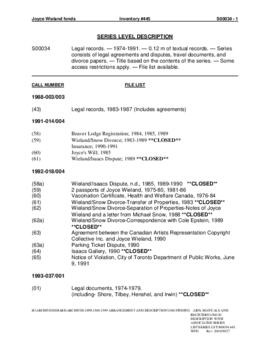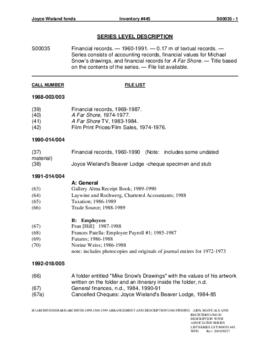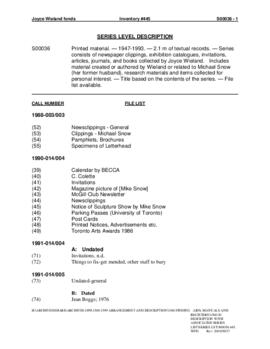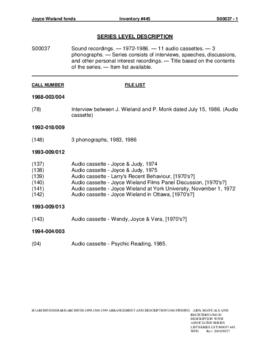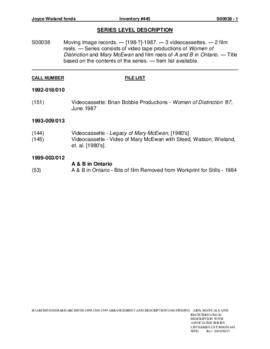Series consists of research material, drafts and correspondence related to Knowlton Nash's published books, including "History on the run : trench coat memories of a foreign correspondent" (1984), "Times to remember : a Canadian photoalbum" (1986), "Prime time at ten : behind-the-camera battles of Canadian TV journalism" (1987), Kennedy and Diefenbaker : fear and loathing across the undefended border"(1990), "Visions of Canada : searching for our future" (1991), The microphone wars : a history of triumph and betrayal at the CBC" (1994), "Cue the elephant! : backstage tales at the CBC" (1996), "Trivia pursuit : how showbiz values are corrupting the news" (1998), and "Swashbucklers : the story of Canada's battling broadcasters" (2001). The series also includes research material related to an untitled work on World War II and several drafts of Nash's unpublished memoir, "A Fly on history's wall : a self-revealing portrait." Research material includes press clippings, photocopied monographs, CBC reports and memos, copies of archival documents and photographs from various institutions and hand-written notes. Early research files frequently include original scripts and copy-text composed by Nash while in the field, on assignment or anchoring a news program, as well as primary source material. These materials include carnival song lyrics distributed during Rio de Janeiro's 1966 carnival, political leaflets and press releases from the Dominican Republic civil war in 1965, and reporter's notes from the 1960s. Research material also includes correspondence with and original recordings on microcassette of interviews with various public figures in Canada, former CBC employees and media moguls which Nash used for several publications. Interviewed subjects include: Fred Davis, Mary DePoe, Max Ferguson, Mary Lou Finlay, Allan Fotheringham, Murray Frum, Vickie Gabereau, Bruno Gerussi, Frank Shuster, Clyde Gilmour, Robert Goulet, Jim Guthro, Peter Gzowski, Bill Harcourt, Nada Harcourt, Don Harron, Lorraine Thomson, Joan Tosoni, Alex Trebeck, Pamela Wallin, Al Waxman, Jack Webster, Brian Williams, Roy Wordsworth, Larry Zolf, Catherine McKinnon, Mavor Moore, Barry Morse, Anne Murray, Leslie Nielson, Sydney Newman, Gordon Pinsent, Harry Rasky, Lloyd Robertson, Paddy Sampson, Elaine Saunders, Frank Shuster, Lister Sinclair, Len Sarmer, Mark Starowicz, Jackie Burroughs, Roger Abbott, Alex Barris, Cameron Bell, Pierre Berton, Allan Byle, Lloyd Bochner, Dave Broadfoot, Don Brown, Lally Cadeau, June Callwood, Norman Campbell, Tom Curzon, Bill Cunningham, Cynthia Dale, Jimmy Dale, John Drewery, Ted Hough, Tommy Hunter, Carol Hyde, Steve Hyde, Frances Hyland, Norman Jewison, Juliette, Betty Kennedy, Harvey Kirck, Bill Longstroth, Donald MacDonald, Larry Mann, Peter Mansbridge, Ray McConell, Murray Brown, Francoise Bertrand, Douglas Bassett, Ivan Fecan, Michael Hindsmith, Finlay MacDonald, Michael McCabe, William McGregor, Trina McQueen, Ross McCreath, Ian Morrison, Bob Rabinovitch, Ted Rogers, and Moses Znaimer. Most of the recorded interviews are transcribed. Series also includes correspondence with publishers regarding the editorial process, publication, promotion, speaking tours and sales of Nash's published books.

